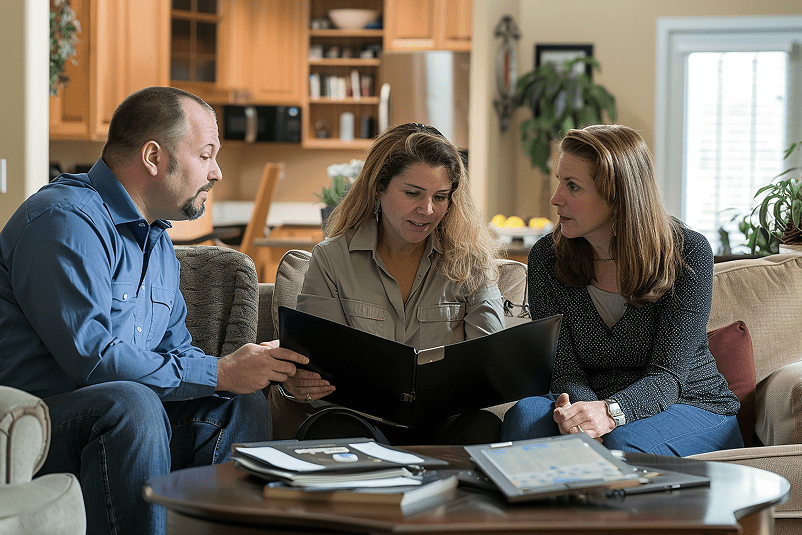Can I Get a Mortgage with a Debt Relief Order (DRO)?
Introduction to Debt Relief Orders
A Debt Relief Order (DRO) is a formal insolvency procedure designed for individuals with relatively low incomes and few assets, who are struggling to pay their debts. It serves as an alternative to bankruptcy, providing a fresh start for those overwhelmed by financial obligations. A DRO can write off certain debts, allowing individuals to begin rebuilding their financial lives without the burden of unmanageable debt.
However, it’s essential to understand the implications of a DRO on mortgage eligibility and credit history. While a DRO can offer significant relief, it also leaves a mark on your credit file for six years, which can affect your ability to secure a mortgage.
This formal insolvency procedure is a powerful tool for debt relief. It requires careful consideration of its long-term impact on your financial future, especially if you plan to apply for a mortgage.
Understanding Debt Relief Orders (DROs)
A Debt Relief Order (DRO) is a formal debt solution available for individuals with low income and minimal assets who are unable to repay their debts. The average debt relief order lasts for 12 months before it is discharged. At the end of the DRO period, all debts included will be written off and you won’t have to repay them.
Once the debt relief order is discharged, all debts from the order are erased from your record. It allows you to write off qualifying debts after 12 months if your financial situation remains unchanged.
However, a DRO has a significant impact on your credit history and can make securing a mortgage more challenging. The DRO affect can lead to higher deposit requirements and more stringent lending criteria from mortgage lenders.
Can I Get a Mortgage After a DRO?
Yes, it is possible to get a mortgage after a Debt Relief Order (DRO), though the process can be more difficult. High street lenders are typically less likely to offer mortgages to individuals with a DRO due to the perceived risk, but specialist lenders are more willing to consider applicants with a past DRO and other credit issues to get on the property ladder.
If you own a home, you will not be granted a Debt Relief Order because you could use your property to pay off your debts. This restriction ensures that individuals with significant assets, such as property, explore other means of resolving their financial difficulties before considering a DRO. You cannot take out a DRO while you have a mortgage.
These lenders will typically have stricter criteria and may offer higher interest rates to reflect the risk of lending. The longer it has been since your DRO, the easier it will be to get a good deal on your mortgage.
What our customers say
Marlon
25 Apr 2025
Showing our favourite reviews

Always attentive, helpful and efficient
Jonathan, 27 Jan 2025

Best Mortgage Broker in the UK!
Liam, 26 Nov 2024

Ben was really helpful in helping me…
George, 28 Aug 2024
What Lenders Look for When You Have Had or Still in a DRO
When you apply for a Debt Relief Order mortgage (DRO), lenders will scrutinise several key factors to assess the risk of lending to you. A DRO indicates a period of financial difficulty, and lenders need reassurance that you have since regained financial stability.
Your income and outgoings are assessed by lenders when you apply for a mortgage, regardless of a DRO. Here’s what lenders typically look for when considering your mortgage application:
Time Since Discharge:
The most crucial factor for many lenders is how much time has passed since your DRO was discharged. Most high street lenders require at least 6 years from the discharge date before they will consider offering you a mortgage. This is because a DRO remains on your credit file for 6 years, and lenders want to see that you have been managing your finances responsibly during that period.
Some niche or specialist lenders may consider offering a mortgage with a shorter period since discharge, but they typically require you to demonstrate that your financial situation has significantly improved.
- High street lenders typically require the DRO to be discharged for at least 6 years.
- Specialist lenders may accept applications as early as 12–36 months post-discharge, depending on your credit recovery.
Post-DRO Financial Behaviour:
Lenders want to see that after the DRO, you have been managing your finances in a responsible manner. They will check whether you’ve been maintaining a clean credit report since the discharge, avoiding any missed payments or additional credit problems.
Consistently paying bills on time, keeping credit card balances low, and avoiding new debt are all positive signals. If you’ve shown that you’ve learned from past financial mistakes and are now financially stable, lenders will be more likely to approve your application.
Credit Score:
Your credit score plays a vital role in the mortgage decision process. While a DRO will negatively affect your credit score, lenders will assess how well you have managed your finances since the DRO.
If you’ve been making timely payments and showing responsible borrowing behaviour, you may have improved your credit score over time. Lenders typically prefer to see a score that is rising post-DRO, as this indicates a strong likelihood that you can manage a mortgage effectively.
Affordability and Income:
Lenders need to be confident that you can afford the mortgage payments without struggling financially. They will assess your income, outgoings, and any other existing debt commitments to ensure that you have enough disposable income to cover your mortgage. Lenders typically like to see that your mortgage repayments will be no more than 30% of your monthly income.
Most lenders look for mortgage repayments to be no more than 30% of your monthly income when assessing affordability. Even if you have a DRO on your record, if you have a stable income and can demonstrate that you live within your means, this can significantly improve your chances of approval.
Deposit Requirements
The larger your deposit, the less risky the lender perceives the loan to be. For applicants with a DRO history, many lenders require a larger deposit than they would for applicants without a financial history problem. This is because a larger deposit helps to reduce the lender’s risk. If you have a debt relief order on your credit file, you may need to put down a larger deposit to reassure lenders and improve your chances of approval.
A deposit of 15% to 25% may be needed to compensate for the risk. A larger deposit demonstrates to the lender that you have financial discipline and have saved up money, which can be an encouraging sign. Additionally, having a larger deposit can improve your chances of obtaining a mortgage, even if you have bad credit.
Overall Financial Situation:
Lenders will also take a broader view of your financial circumstances, including your employment stability, whether you are self-employed or employed, and whether you have any assets or other forms of financial security.
If you are self-employed, lenders may want to see a consistent track record of earnings, typically for at least 2-3 years. During the DRO period, individuals face limitations on certain business activities, such as being unable to serve as a director or manage a company.
Evidence of the DRO’s Impact:
Some lenders may request a more detailed explanation of the circumstances surrounding the DRO. They may ask for an explanation of the financial hardship you experienced and how you have since overcome those challenges.
Being transparent and demonstrating that you are now in a stronger financial position will help lenders feel more comfortable approving your mortgage. During the period of a debt relief restriction order, individuals face restrictions that can hinder their ability to take out large loans.
Additional Credit Issues
Individuals with a DRO may experience additional credit issues, such as late payments, defaults, or county court judgments. These credit issues can further complicate the mortgage application process, making it more challenging to secure favorable terms. However, specialist lenders and mortgage brokers can assist individuals with adverse credit histories, including those with a DRO, in finding suitable mortgage options.
Addressing these credit issues is crucial for improving mortgage eligibility. This involves taking steps to rectify any late payments, resolving defaults, and managing any county court judgments.
By working towards improving your credit score and demonstrating financial responsibility, you can increase your chances of securing a mortgage. Specialist lenders are more willing to consider applicants with a history of credit issues, and a knowledgeable mortgage broker can help you navigate the complexities of the mortgage market to find the best deals available.
High Street Lenders Offering Mortgages After a DRO
These high street lenders are more cautious when offering mortgages to those with a DRO on their credit file, but some will consider your application if you meet their criteria.
| Lender | Time Since DRO Discharge | Loan-to-Value (LTV) | Deposit Required | Income Requirements | Additional Notes |
| Halifax | 6 years | Up to 90% | 10%–15% | Stable income and affordability checks | Must meet all criteria for higher LTV |
| Nationwide | 6 years | Up to 90% | 10%–20% | Proof of stable income | Prefers DRO to be discharged for at least 6 years |
| Barclays | 6 years | 85%–90% | 10%–20% | Stable income required | Standard affordability applies |
| Santander | 6 years | Up to 85% | At least 15% | Must show stable income and affordability | More cautious at higher LTV levels |
| TSB | 6 years | Up to 85% | 10%–15% | Stable income required | Assessed on full application strength |
Specialist Lenders Offering Mortgages After a DRO
Specialist lenders are more willing to offer mortgages to applicants who have a Debt Relief Order. These lenders cater to individuals with non-standard credit histories, including those who have faced financial difficulties. Working with a specialist broker can help you identify lenders who are more likely to approve your application, given your credit history.
| Lender | Min. Time Since DRO Discharge | Max LTV | Deposit Required | Income Requirements | Additional Notes |
| Aldermore | 3 years (depending on severity) | Up to 85%–90% | 10%–15% | Employed and self-employed considered; proof of stable income required | Accepts adverse credit including DROs; case-by-case assessment via broker. |
| Bluestone Mortgages | No set minimum (but under 6 yrs may incur rate loading) | Up to 90% | 10%+ | Employed: 3 months’ payslips + P60. Self-employed: 1 year SA302 | No credit scoring; manual underwriting. Allows recent DROs. Communication defaults ignored. |
| Precise Mortgages | 6 years | Up to 85% | 15% | Employed: min £15,000. Self-employed accepted (1+ years) | Discharged DRO must be over 6 years old. Flexible on past adverse. |
| Kensington Mortgages | 6 years | Up to 90%–95% | 5%–10% | Employed/self-employed with provable stable income | No automated scoring. Accepts historical adverse. Gifted deposits accepted. |
| The Mortgage Lender | 3–6 years | Up to 85% | 15% | Employed and self-employed considered | DRO must be discharged for at least 3 years. May require explanation of circumstances. |
| Pepper Money | 3–6 years | Up to 85% | 15% | Must evidence affordability and regular income | DRO accepted after 3+ years discharged. Tiered product range based on severity and recency of credit issues. |
| Foundation Home Loans | 3 years | Up to 80% | 20% | Employed/self-employed with 1–2 years proof | DROs allowed after 3 years. Flexible underwriting for complex income and previous credit issues.
|
Why Work with Option Finance Mortgages?
At Option Finance, we specialise in mortgages for complex credit scenarios. Our team works with all major bad credit lenders and has access to exclusive deals that aren’t available on the high street.
Understanding one’s credit report from a credit reference agency can help in securing a mortgage.
Over 20 years of experience
Full market access to specialist lenders
Fast, honest, and personalised mortgage advice
Expert help with complex or recent credit issues
Showing our favourite reviews

Always attentive, helpful and efficient
Jonathan, 27 Jan 2025

Best Mortgage Broker in the UK!
Liam, 26 Nov 2024

Ben was really helpful in helping me…
George, 28 Aug 2024
Key Requirements to Secure a Mortgage with a DRO
To increase your chances of getting approved for a mortgage after a Debt Relief Order, you will need to meet certain criteria, which include:
- Time Since Discharge: Most high street and specialist lenders require a minimum of 6 years since the DRO was discharged, though some niche lenders may accept shorter periods.
- Credit Score: A clean credit record post-DRO is important. Lenders want to see that you have managed your finances responsibly after your DRO was discharged.
- Stable Income: Lenders need to see proof of a stable income to ensure you can afford mortgage repayments.
- Deposit Size: A bigger deposit (typically between 15% and 25%) can improve your chances of securing a mortgage, as it lowers the lender’s perceived risk. Most lenders will likely ask for a higher deposit for applicants with a DRO than they would for those with no credit issues.
- Affordability: Lenders will assess your ability to afford the dro mortgage based on your income and outgoings.
How to Improve Mortgage Eligibility
To improve mortgage eligibility after a DRO, individuals should focus on rebuilding their credit history and demonstrating good financial management. Here are some actionable steps to consider:
Making Timely Payments on Existing Debts: Consistently paying your bills on time is one of the most effective ways to improve your credit score. This shows lenders that you are responsible and capable of managing your finances.
Reducing Debt Levels: Lowering your overall debt can positively impact your credit rating. Aim to pay down existing debts to reduce your debt-to-income ratio.
Avoiding New Credit Applications: Each credit application can result in a hard inquiry on your credit report, which can temporarily lower your score. Avoid applying for new credit unless absolutely necessary.
Monitoring Credit Reports for Errors or Inaccuracies: Regularly check your credit reports to ensure all information is accurate. Dispute any errors you find, as they can negatively affect your credit score.
Working with a Specialist Mortgage Broker to Find Suitable Lenders: A specialist mortgage broker can help you identify lenders who are more likely to approve your application, given your credit history.
Considering a Larger Deposit to Reduce the Loan-to-Value Ratio: A larger deposit reduces the lender’s risk and can improve your chances of securing a mortgage. It also shows financial discipline and the ability to save.
Providing Evidence of a Stable Income and Employment History: Lenders want to see that you have a reliable source of income and a stable job. Providing proof of consistent earnings can reassure lenders of your ability to make mortgage repayments.
By taking these steps, individuals can improve their credit rating and increase their chances of getting approved for a mortgage, even with a DRO on their credit file. It’s essential to seek professional advice from a specialist mortgage broker to navigate the complex process of applying for a mortgage after a DRO.
Pros of Getting a Mortgage After a DRO
- Homeownership Opportunity: A mortgage can provide you with the opportunity to own a home again, even after experiencing financial difficulties.
- Credit Rebuilding: Regular mortgage payments will help improve your credit score over time, making it easier to access other credit products in the future.
- Access to Specialist Lenders: There are several specialist lenders who are more willing to offer mortgages to people with a DRO, which expands your options.
Cons of Getting a Mortgage After a DRO
- Higher Interest Rates: Specialist lenders and high street lenders may offer higher interest rates to applicants with a DRO, meaning your monthly payments could be higher.
- Limited Mortgage Products: The range of products available to those with a DRO is often narrower, and you may not have access to the best rates.
- Strict Eligibility Criteria: Many lenders have strict requirements, such as a larger deposit or stable, higher income, which can make securing a mortgage more challenging.
Conclusion
Obtaining a mortgage after a Debt Relief Order (DRO) is certainly possible with the right approach. High street lenders like Halifax, Nationwide, and Barclays are more cautious but may consider your application after 6 years post-DRO.
A debt relief order (DRO) remains on your credit file for six years after it is registered, after which it will be removed. Additionally, specialist lenders like The Mortgage Lender, Together Money, and Precise Mortgages are more willing to offer mortgages to individuals with a DRO, albeit with stricter criteria and potentially higher interest rates.
By waiting until your DRO is discharged for the required period, maintaining a clean credit record, saving for a larger deposit, and seeking expert advice from a specialist mortgage broker, you can significantly improve your chances of securing a mortgage and finding the right lender. If it’s been under a year since you were discharged, it’s probably best to wait a little longer before applying for a mortgage.
Get help from an experienced mortgage broker.
You can speak to one of our specialist brokers who would be able to guide you through the process. They will advise if there is a lender available and find the right deal with the maximum loan amount based on your circumstances. We are a whole of market mortgage brokerage with access to all lenders. Call us on 01332 470400 or complete the form with your details for us to give you a call back.
FAQs
Can I get a mortgage after a Debt Relief Order?
Yes, you can. While it’s more difficult to secure a mortgage from high street lenders, many specialist mortgage providers consider applications from individuals with a past DRO—especially if it’s been over 12–36 months since discharge and your financial situation has improved.
How long after a DRO do I need to wait before applying for a mortgage?
It depends on the lender. Most high street lenders require the DRO to be discharged for at least 6 years, but some specialist lenders may consider you after 12–36 months, especially if you can show financial stability and affordability.
Will a DRO affect my credit score?
Yes, a DRO will appear on your credit file for 6 years and can significantly lower your credit score. However, your score can recover over time—especially if you build a good payment history and avoid further credit issues after your DRO.
Can I apply for a DRO if I already have a mortgage?
No. One of the conditions of applying for a DRO is that you must not own a property. If you already have a mortgage, you wouldn’t be eligible for a DRO.
Do I need a bigger deposit after a DRO?
Yes, most lenders will ask for a larger deposit—typically 15% to 25%—to offset the perceived risk. A bigger deposit not only improves your chances of approval but may also help you access better rates from certain lenders.
What do lenders look for after a DRO?
Lenders will look at:
- How long ago the DRO was discharged
- Your credit behaviour since then
- Your current income and employment status
- The size of your deposit
- Affordability and overall financial health
Showing stability and responsibility post-DRO can make a big difference.
Which lenders offer mortgages after a DRO?
Some high street lenders like Halifax, Nationwide, and Barclays may consider you 6 years post-discharge. However, specialist lenders such as Bluestone Mortgages, Aldermore, Precise Mortgages, and Pepper Money are often more flexible and may accept applications sooner—especially through a mortgage broker.
Will I get a higher interest rate with a DRO on my record?
In most cases, yes. Mortgages for those with past credit issues tend to come with slightly higher interest rates. But this can improve over time, especially if you remortgage later with a better credit profile.
What documents will I need to apply for a mortgage after a DRO?
You’ll typically need:
- Proof of income (payslips, SA302s, or accounts)
- Bank statements
- ID and proof of address
- A credit report (optional but helpful)
- An explanation of the DRO if requested by the lender
Should I wait longer or apply now?
If your DRO was discharged less than 12 months ago, waiting may be the smarter move—especially to build your credit and save a larger deposit. If it’s been 2+ years and you have stable income and no further credit issues, a specialist broker can help you explore current options now.
Why use Option Finance for a post-DRO mortgage?
We understand that life happens—and that financial recovery is possible.
- We work with all major bad credit lenders
- We manually assess your situation, not just your credit score
- We offer fast, personal advice tailored to your goals
- We’ve helped many clients get mortgages after a DRO and other credit issues
Ready to Take the First Step?
Whether you’re a first-time buyer, remortgaging, or moving home, bad credit doesn’t have to hold you back.
Understanding credit scoring can help you prepare for a mortgage application. You can speak to one of our specialist mortgage brokers who would be able to guide you through the process. They will advise if there is a lender available and the maximum loan amount based on your circumstances. We are a whole of market mortgage brokerage with access to all lenders.































